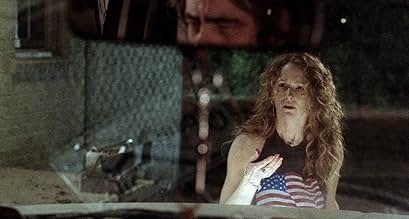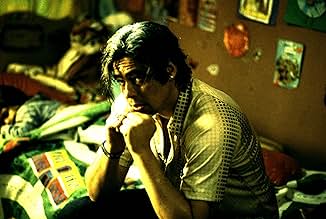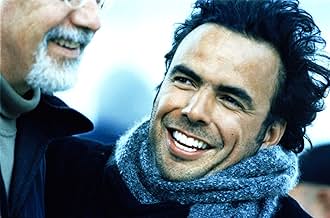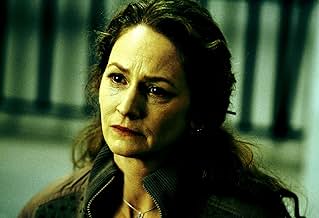Un extraño accidente reúne a un matemático, una madre afligida y un ex convicto.Un extraño accidente reúne a un matemático, una madre afligida y un ex convicto.Un extraño accidente reúne a un matemático, una madre afligida y un ex convicto.
- Nominado a 2 premios Óscar
- 30 premios ganados y 79 nominaciones en total
Marc Musso
- Freddy
- (as Marc Thomas Musso)
- Dirección
- Guionista
- Todo el elenco y el equipo
- Producción, taquilla y más en IMDbPro
Opiniones destacadas
Alejandro Gonzalez Inarritu made a well-deserved leap into the renown film-making pool with Amores Perros, and his follow up 21 Grams shows him with plenty of talent to spare. He also gets three (or more, depends on how effective one thinks the supporting performance were) forceful, compelling performances out of Sean Penn, Benicio Del-Torro, and Naomi Watts. They're involved in three interlocking stories- Penn as a mathematician with a rottening health and a near-rottening relationship; Del-Torro's found Jesus Christ after being in and out of jail for part of his life; Watts is a house-wife who may have some deep troubles within her mind. Each of the three leads doesn't go for cheap drama, and each one plunges the depths of their own abilities to find truths that might not be possible with lesser material or a lesser director. I won't say much more about the stories, however I do have something to say about the structure of the film. The script brings some mesmerizing scenes, ones with great tragedy that bring out a viewer's compassion.
Never-the-less, there was something about the structure that I didn't think was all that great. In films like Once Upon a Time in America, Reservoir Dogs, and even Memento, the scrambled story structure had a purpose, adding appropriate twists and turns for the audience. 21 Grams (like Amores Perros in a sense) has that non-linear basis to it too, and sometimes it works for the audience to react. But I think there would be a lot more power to how these characters' fates and tragedies unfold if it was told linearly from start to finish. In many moments in the film I found myself knowing a little too much before a particular scene unfolded, or I found myself guessing about something that I didn't need to (one of the points of non-linear storytelling is answers first, questions later). It wasn't an aspect that made the film bad, yet the stock that writer Guillermo Arriaga and director Inarritu put into this structure over interlocking the stories in order, or perhaps telling each story separately, is the film's only drawback.
Never-the-less, there was something about the structure that I didn't think was all that great. In films like Once Upon a Time in America, Reservoir Dogs, and even Memento, the scrambled story structure had a purpose, adding appropriate twists and turns for the audience. 21 Grams (like Amores Perros in a sense) has that non-linear basis to it too, and sometimes it works for the audience to react. But I think there would be a lot more power to how these characters' fates and tragedies unfold if it was told linearly from start to finish. In many moments in the film I found myself knowing a little too much before a particular scene unfolded, or I found myself guessing about something that I didn't need to (one of the points of non-linear storytelling is answers first, questions later). It wasn't an aspect that made the film bad, yet the stock that writer Guillermo Arriaga and director Inarritu put into this structure over interlocking the stories in order, or perhaps telling each story separately, is the film's only drawback.
21 Grams features performances by Sean Penn, Benecio Del Torro and Naomi Watts that are remarkable not only for their believability, but also for the range of gut wrenching emotion they bring to bear. Telling his story almost violently out of sequence, Iñárritu makes no apology for presenting information in a manner that is often abrupt and/or confusing. His choice to juxtapose a myriad of images to reveal the complexities and subtleties of the characters challenges the viewer even as it elevates the story.
Each of the three main characters faces a series of crises that unfold in the fullness of Iñárritu's version of time. By so carefully painting characters' surroundings along with their reactions to the events that change their lives, lead characters are stripped to the bone. The supporting cast is nothing short of miraculous (notably Clea Duvall, Charlotte Gainsborg and Melissa Leo) and completes a wonderfully complex series of portraits of the three main characters.
Like few films in recent memory, 21 Grams fully reveals what it is to be human in the clutches of life's most challenging moments.
Each of the three main characters faces a series of crises that unfold in the fullness of Iñárritu's version of time. By so carefully painting characters' surroundings along with their reactions to the events that change their lives, lead characters are stripped to the bone. The supporting cast is nothing short of miraculous (notably Clea Duvall, Charlotte Gainsborg and Melissa Leo) and completes a wonderfully complex series of portraits of the three main characters.
Like few films in recent memory, 21 Grams fully reveals what it is to be human in the clutches of life's most challenging moments.
When lives collide, often no one is around to witness the effects of the collision. Alejandro González Iñárritu, however, has captured the profound effects in 21 Grams. How much does life weigh? Iñárritu may not answer that question directly, but he does indirectly answer the question darkly and beautifully in 21 Grams.
21 Grams tells the story of three lives brought together by tragedy: the life of a very sick man (Penn), a mother who has lost much (Watts), and a Christian who has recently reformed his ways (Del Toro). Really, these characters and their once-"simple" lives are the focus of this film, and all three characters are mysterious and deep. Each of the three actors gives an excellent performance, but it is Watts who stands out in all her angst. All of them deserved Academy Award nominations, and Penn would've received one along with Watts and Del Toro if not for his incredible performance in Mystic River.
Arriaga's screenplay is incredible too, leaving the outcome inexplicable enough to be real and to make sense. Santaolalla's score is odd enough to fit the dark atmosphere that pervades the film, and stick around for the credits to hear Dave Matthews' fitting conclusion. Also, Prieto's and Procopio's cinematography is gritty enough to depict the unbearable anguish of the characters.
I would praise the direction as well, except that I do have one complaint regarding it. It is often so choppy and irregular that it causes the story to lose a tiny bit of its impact. Perhaps this choppiness fits the film too, but to me it was distracting.
Yet you should definitely check this one out for a sorrowful picture of torment, disgust, and a strange beauty.
Final Grade: A.
21 Grams tells the story of three lives brought together by tragedy: the life of a very sick man (Penn), a mother who has lost much (Watts), and a Christian who has recently reformed his ways (Del Toro). Really, these characters and their once-"simple" lives are the focus of this film, and all three characters are mysterious and deep. Each of the three actors gives an excellent performance, but it is Watts who stands out in all her angst. All of them deserved Academy Award nominations, and Penn would've received one along with Watts and Del Toro if not for his incredible performance in Mystic River.
Arriaga's screenplay is incredible too, leaving the outcome inexplicable enough to be real and to make sense. Santaolalla's score is odd enough to fit the dark atmosphere that pervades the film, and stick around for the credits to hear Dave Matthews' fitting conclusion. Also, Prieto's and Procopio's cinematography is gritty enough to depict the unbearable anguish of the characters.
I would praise the direction as well, except that I do have one complaint regarding it. It is often so choppy and irregular that it causes the story to lose a tiny bit of its impact. Perhaps this choppiness fits the film too, but to me it was distracting.
Yet you should definitely check this one out for a sorrowful picture of torment, disgust, and a strange beauty.
Final Grade: A.
Some movies are like a novel. Some movies are like a poem. Some films have flashbacks and flash-forwards. Some, like `Memento,' stretch the boundaries of convention and take wild risks such as moving the drama from the end to the beginning. `21Grams' is a cinematic poetic explosion, shaking all the pieces hard as hell, and then tossing them in the air to fall at random. Directed by Alejandro Gonzalez Inarritu, he gives the audience the puzzle unraveled, demanding that we piece together the story from interlaced past, present and future events. It is part flashy gimmick, part artistic mastery, but always compelling.
This is not a film for either the faint of heart or lazy of mind. Nor is it for those who become frustrated by film that dares to step outside the linear plot and paint-by-numbers formula. The mishmash of past/present/future is allegorical in the sense that we all carry our past, all hinge our hearts on the future, and all struggle with a `present' as dotty and haunted as this film so wildly illustrates.
In `21 Grams' it is required that the viewer surrender. As in life, there is no control. I must admit that I became a bit antsy and pressed for answers when none were being provided. You are riveted by events and players that intermingle in a haphazard mishmash of time with a rebellious lack of structure. You can either go with the flow-or back out to your car. Since I saw only one person exit the theater, for any reason, in the 125 minutes running time, I conclude that the fully occupied theater was as riveted as I was, even to the point of extreme bladder control.
The performances are stunning. Sean Penn is always good, Benicio Del Toro solidifies his Oscar, and Naomi Watts is the big talent to watch. Her emotional honesty is beyond acting-I believed her to feel the pain she displayed.
The `plot' almost seems inconsequential. The film is about the depth of human feeling in our brief interplay between living and dying. It's about damnation and redemption, revenge and forgiveness, surrender and salvation. It offers no explanations. It merely illustrates the human experience in a trenchant manner that makes us aware that every minute of every day is a precarious drama that we look upon more lightly than we should. The dramatic cortex is the human heart-lost, gained, tormented, anguished and confused. The metaphorical context is the fleeting nature of each heart's temporal beat and our desperately valiant struggle to flesh out our mortal hearts' desires.
This is not a film for either the faint of heart or lazy of mind. Nor is it for those who become frustrated by film that dares to step outside the linear plot and paint-by-numbers formula. The mishmash of past/present/future is allegorical in the sense that we all carry our past, all hinge our hearts on the future, and all struggle with a `present' as dotty and haunted as this film so wildly illustrates.
In `21 Grams' it is required that the viewer surrender. As in life, there is no control. I must admit that I became a bit antsy and pressed for answers when none were being provided. You are riveted by events and players that intermingle in a haphazard mishmash of time with a rebellious lack of structure. You can either go with the flow-or back out to your car. Since I saw only one person exit the theater, for any reason, in the 125 minutes running time, I conclude that the fully occupied theater was as riveted as I was, even to the point of extreme bladder control.
The performances are stunning. Sean Penn is always good, Benicio Del Toro solidifies his Oscar, and Naomi Watts is the big talent to watch. Her emotional honesty is beyond acting-I believed her to feel the pain she displayed.
The `plot' almost seems inconsequential. The film is about the depth of human feeling in our brief interplay between living and dying. It's about damnation and redemption, revenge and forgiveness, surrender and salvation. It offers no explanations. It merely illustrates the human experience in a trenchant manner that makes us aware that every minute of every day is a precarious drama that we look upon more lightly than we should. The dramatic cortex is the human heart-lost, gained, tormented, anguished and confused. The metaphorical context is the fleeting nature of each heart's temporal beat and our desperately valiant struggle to flesh out our mortal hearts' desires.
Many movies in the modern era have experimented with fractured chronology, but most of the time this technique is used for entertainment purposes only. "21 Grams" is an intense and thoughtful film enriched by this technique, taken to an extreme I've never seen before. We're not talking "Pulp Fiction" here, where a small series of vignettes are arranged out of sequence. Every individual scene in "21 Grams" seems to be distributed almost at random anywhere in the film. You have to concentrate when seeing this film for the first time, because you'll have trouble figuring out what's going on, and even as a plot starts to emerge, some of the details won't be understandable until the very end. But it pays off: this isn't like "Memento" or "Mulholland Drive," where you may need multiple viewings to understand it all. By the end of this film, the story turns out to be quite straightforward. It's like seeing a gigantic jigsaw puzzle gradually pieced together.
Unlike many other films that use this sort of device, "21 Grams" is a character drama, not a psychological thriller. The story would still work if it were told in chronological order. Why the scenes are arranged as they are is not altogether clear, on the surface. I felt like I was watching a mystery, but after everything came together it became evident that none of the mystery was contained in the plot itself. This fact has led some critics to suggest that the scrambled scene arrangement is nothing more than a cute gimmick designed to make the film more engaging. But I believe that the device does serve a legitimate purpose, by drawing out the complexity of the characters and their situations.
Life is not good for the three principal characters, and it isn't getting better. Sean Penn plays a 40-something man with a failing heart, Naomi Watts plays a young woman facing great tragedy, and Benicio Del Toro plays an ex-con consumed by guilt. Penn and Watts come off as ordinary individuals reacting as anyone might under the circumstances, but Del Toro's character is particularly fascinating. He's been rehabilitated through religion, but he's still far from perfect. As a father, he has a scary presence that makes him seem borderline abusive at times. But he has developed a powerful conscience. Is he right to hate himself for what he did? The movie never answers that question. I just appreciated that the film resisted the temptation to make him into a caricature. He is neither hero nor villain. He is simply understandable on a very basic human level, as are the other two characters.
We have the feeling that Watts and Penn are wrong to condemn him as strongly as they do. They do not understand his situation, or that he's suffering just about as much as they are. On the other hand, we as viewers can perfectly understand where Watts is coming from. That's what makes the scrambled scene arrangement so effective: it never allows any one character to gain our total sympathy. By the time we've sorted out the plot threads, we've identified with all three characters on an emotional level while at the same time understanding their faults. These people are trapped in their own limited worlds, and with our omniscient viewpoint we can scarcely blame any one of them for their feelings or actions. We can see clearly what these characters cannot, which is that they are more victims of cruel fate than people who are truly guilty of anything.
What is the movie's message? That people shouldn't be so quick to judge others? That could be one interpretation, but what's nice about the film is that it doesn't hammer this lesson into us. It just tells a moving and stirring tale about complex characters, and viewers can take from it what they please. The title refers to a parapsychological belief about the weight of the human soul, and it's used in this film as a metaphor for the fragility of life. If life is fragile, then it's also precious, and people need not waste their time on vengeance.
Unlike many other films that use this sort of device, "21 Grams" is a character drama, not a psychological thriller. The story would still work if it were told in chronological order. Why the scenes are arranged as they are is not altogether clear, on the surface. I felt like I was watching a mystery, but after everything came together it became evident that none of the mystery was contained in the plot itself. This fact has led some critics to suggest that the scrambled scene arrangement is nothing more than a cute gimmick designed to make the film more engaging. But I believe that the device does serve a legitimate purpose, by drawing out the complexity of the characters and their situations.
Life is not good for the three principal characters, and it isn't getting better. Sean Penn plays a 40-something man with a failing heart, Naomi Watts plays a young woman facing great tragedy, and Benicio Del Toro plays an ex-con consumed by guilt. Penn and Watts come off as ordinary individuals reacting as anyone might under the circumstances, but Del Toro's character is particularly fascinating. He's been rehabilitated through religion, but he's still far from perfect. As a father, he has a scary presence that makes him seem borderline abusive at times. But he has developed a powerful conscience. Is he right to hate himself for what he did? The movie never answers that question. I just appreciated that the film resisted the temptation to make him into a caricature. He is neither hero nor villain. He is simply understandable on a very basic human level, as are the other two characters.
We have the feeling that Watts and Penn are wrong to condemn him as strongly as they do. They do not understand his situation, or that he's suffering just about as much as they are. On the other hand, we as viewers can perfectly understand where Watts is coming from. That's what makes the scrambled scene arrangement so effective: it never allows any one character to gain our total sympathy. By the time we've sorted out the plot threads, we've identified with all three characters on an emotional level while at the same time understanding their faults. These people are trapped in their own limited worlds, and with our omniscient viewpoint we can scarcely blame any one of them for their feelings or actions. We can see clearly what these characters cannot, which is that they are more victims of cruel fate than people who are truly guilty of anything.
What is the movie's message? That people shouldn't be so quick to judge others? That could be one interpretation, but what's nice about the film is that it doesn't hammer this lesson into us. It just tells a moving and stirring tale about complex characters, and viewers can take from it what they please. The title refers to a parapsychological belief about the weight of the human soul, and it's used in this film as a metaphor for the fragility of life. If life is fragile, then it's also precious, and people need not waste their time on vengeance.
¿Sabías que…?
- TriviaThe film was shot almost completely with hand-held cameras.
- ErroresWhen the Private Investigator gives Paul the revolver, he flips it open to show that it is loaded. He then spins the cylinder and we hear a ratcheting sound. When a revolver is open, there is no ratchet mechanism connected to the cylinder...it rotates freely and silently.
- Citas
[last lines]
Paul Rivers: How many lives do we live? How many times do we die? They say we all lose 21 grams... at the exact moment of our death. Everyone. And how much fits into 21 grams? How much is lost? When do we lose 21 grams? How much goes with them? How much is gained? How much is gained? Twenty-one grams. The weight of a stack of five nickels. The weight of a hummingbird. A chocolate bar. How much did 21 grams weigh?
- Créditos curiososThanks to ÁLos amo!
- Bandas sonorasCan We Get Together
(2003)
Written by Renee Funderburgh, Anson Funderburgh and John Street
Performed by Anson Funderburgh & The Rockets (as Anson Funderburgh and Rockets)
Licensed courtesy of Bullseye Blues & Jazz, a Rounder Records Group label
By Arrangement with Ocean Park Music Group
Selecciones populares
Inicia sesión para calificar y agrega a la lista de videos para obtener recomendaciones personalizadas
- How long is 21 Grams?Con tecnología de Alexa
Detalles
- Fecha de lanzamiento
- País de origen
- Sitio oficial
- Idioma
- También se conoce como
- 21 Grams
- Locaciones de filmación
- Productoras
- Ver más créditos de la compañía en IMDbPro
Taquilla
- Presupuesto
- USD 20,000,000 (estimado)
- Total en EE. UU. y Canadá
- USD 16,290,476
- Fin de semana de estreno en EE. UU. y Canadá
- USD 274,454
- 23 nov 2003
- Total a nivel mundial
- USD 60,466,876
- Tiempo de ejecución
- 2h 4min(124 min)
- Color
- Mezcla de sonido
- Relación de aspecto
- 1.85 : 1
Contribuir a esta página
Sugiere una edición o agrega el contenido que falta



















